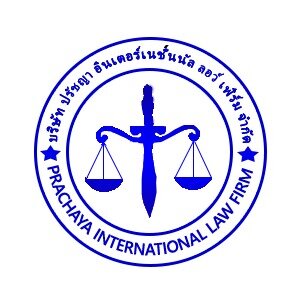Best Employment Rights Lawyers in Thailand
Share your needs with us, get contacted by law firms.
Free. Takes 2 min.
Or refine your search by selecting a city:
List of the best lawyers in Thailand
Legal guides written by Smart Legal Solutions:
- Main Legal Measures to Protect Foreign Investment in Thailand
- The importance of the geographical indications for the Thai economy
Thailand Employment Rights Legal Articles
Browse our 2 legal articles about Employment Rights in Thailand written by expert lawyers.
- Thailand Employment Law: Essentials for Hiring and Retaining Talent
- In a world that is constantly changing, Thailand has become a very attractive place for companies who want to grow or start up in the lively South East Asia area. However, entering this beautiful landscape requires great knowledge of Thai employment laws which are a maze that can confuse even... Read more →
- A Guide to Navigating Thailand's Corporate Compliance Landscape
- Thailand offers an enticing economy and strategic position in Southeast Asia, making it a desirable destination for businesses of all sizes. Yet, succeeding in Thailand demands a solid grasp of the country's corporate compliance landscape. Our latest legal guide explores the key facets of Thai compliance, uncovering the issues, initiatives,... Read more →
About Employment Rights Law in Thailand
Employment rights in Thailand are primarily governed by the Labor Protection Act, the Civil and Commercial Code, and related legislations. These laws aim to safeguard the rights and welfare of both employees and employers in the workplace, setting guidelines for working conditions, wages, working hours, benefits, workplace safety, and dispute resolution. Employers must comply with these regulations to ensure fair treatment of employees, while employees have the right to seek remedies through the legal system if their rights are violated.
Why You May Need a Lawyer
There are several situations where individuals may require legal assistance in the realm of employment rights:
- Unfair Dismissal: If you believe you have been unjustly terminated, consultation with a lawyer can help you understand your rights and possible recourse.
- Wage Disputes: Initial resolution of salary or overtime pay issues may involve legal intervention.
- Discrimination or Harassment: Experiencing these at the workplace and seeking legal advice can help you address such issues effectively.
- Contractual Issues: If there are discrepancies in employment contracts or agreements, a lawyer can provide valuable insights.
- Health and Safety Concerns: If your working environment is unsafe, legal counsel can guide potential legal actions to ensure compliance and improvements.
Local Laws Overview
Understanding key aspects of employment laws in Thailand is crucial for both employees and employers:
- Minimum Wage: Thailand has a mandatory minimum wage policy that varies by province, ensuring fair baseline compensation for workers.
- Working Hours: The standard working hours are set at 8 hours per day or 48 hours per week. Overtime work must be compensated accordingly.
- Annual Leave: Employees are entitled to a minimum of 6 days of annual leave after one year of employment, as well as additional public holidays.
- Severance Pay: The law mandates severance pay based on the length of service upon termination without cause.
- Social Security Benefits: Employers must register employees with the Social Security Office, contributing to insurance that covers health, injury, and retirement benefits.
Frequently Asked Questions
What are my rights regarding overtime pay in Thailand?
Employees are entitled to receive overtime pay at a rate higher than the regular hourly wage. The rate typically ranges from 1.5 to 3 times the normal rate, depending on the circumstances.
Can my employer change the terms of my employment contract without my consent?
No, any significant change in the contract terms requires mutual consent. Unilaterally altering the terms may violate labor laws unless mutually agreed upon by both parties.
How is termination handled under Thai labor law?
Termination must be legally justified, and severance pay is typically required based on the duration of employment, unless the dismissal is for serious misconduct.
What protections exist against workplace discrimination?
The Labor Protection Act and other regulations prohibit discrimination based on gender, age, religion, race, or disability, providing grounds for legal action if violated.
Am I entitled to compensation if I am injured at work?
Yes, employees are eligible for compensation through the Workmen's Compensation Fund, which covers medical expenses and disability benefits.
What is the probation period, and how does it work?
The probation period is a trial period usually agreed upon in the employment contract. During this time, both employer and employee can evaluate suitability before permanent employment is confirmed.
Are part-time workers entitled to the same benefits as full-time employees?
Part-time workers have rights similar to full-time employees but may have pro-rated benefits depending on the hours worked.
How do maternity leave rights work?
Female employees are entitled to 90 days of maternity leave, with 45 days paid by the employer, and the remainder paid through social security contributions under certain conditions.
Can my employer withhold my final paycheck?
No, employers are required to provide the final paycheck, including all due compensation, promptly after termination of employment.
What can I do if my employer doesn’t pay my salary on time?
If delays occur, you can first try resolving the issue directly with your employer. If unresolved, legal action can be sought through the Labor Court or Labor Protection Office.
Additional Resources
Several resources can assist in understanding and enforcing employment rights in Thailand:
- Ministry of Labor: Offers comprehensive information and services related to labor laws.
- Social Security Office: Provides assistance regarding social security benefits and registrations.
- Legal Aid Centers: Various non-profit organizations and legal aid centers offer free or low-cost legal services.
- Labor Protection Office: Assists with filing complaints and resolving disputes.
Next Steps
If you require legal assistance in employment rights, consider the following steps:
- Consult with a Lawyer: Schedule a meeting with a qualified employment lawyer to assess your situation and provide legal advice.
- Prepare Documentation: Gather all relevant documents, such as contracts, pay stubs, and correspondence, for review by your lawyer.
- Explore Mediation: Some disputes can be settled through mediation, a less adversarial approach than court proceedings.
- File a Complaint: If necessary, you may need to file a complaint with the appropriate governmental bodies, such as the Ministry of Labor or Labor Court.
- Stay Informed: Continually educate yourself about your employment rights to prevent future issues and ensure compliance with local laws.
Lawzana helps you find the best lawyers and law firms in Thailand through a curated and pre-screened list of qualified legal professionals. Our platform offers rankings and detailed profiles of attorneys and law firms, allowing you to compare based on practice areas, including Employment Rights, experience, and client feedback.
Each profile includes a description of the firm's areas of practice, client reviews, team members and partners, year of establishment, spoken languages, office locations, contact information, social media presence, and any published articles or resources. Most firms on our platform speak English and are experienced in both local and international legal matters.
Get a quote from top-rated law firms in Thailand — quickly, securely, and without unnecessary hassle.
Disclaimer:
The information provided on this page is for general informational purposes only and does not constitute legal advice. While we strive to ensure the accuracy and relevance of the content, legal information may change over time, and interpretations of the law can vary. You should always consult with a qualified legal professional for advice specific to your situation.
We disclaim all liability for actions taken or not taken based on the content of this page. If you believe any information is incorrect or outdated, please contact us, and we will review and update it where appropriate.
Browse employment rights law firms by city in Thailand
Refine your search by selecting a city.














